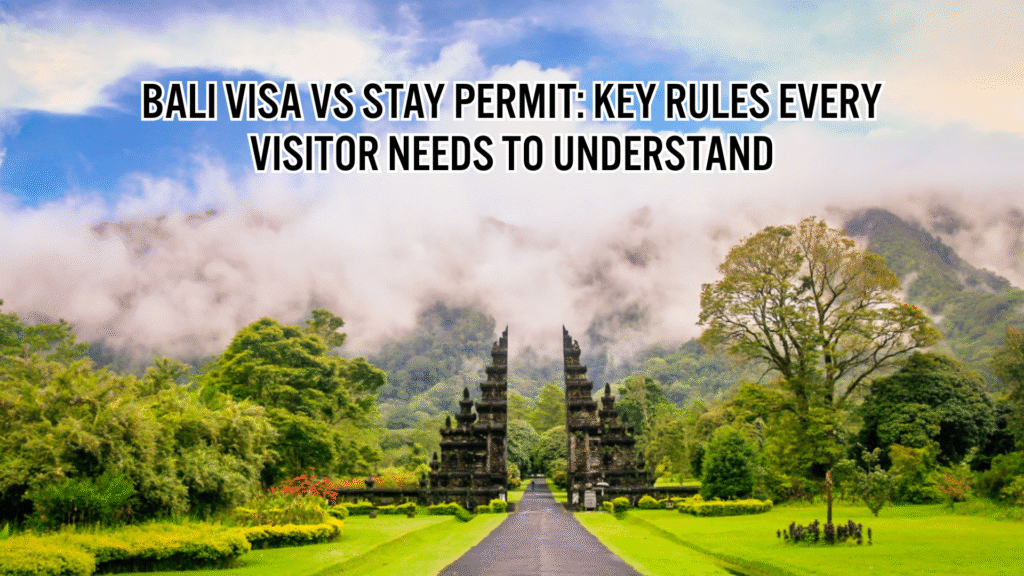Are you planning a long stay in Indonesia’s most beloved island? Understanding the Bali visa and stay permit process is crucial for ensuring a smooth and legal experience during your visit in 2025. While Bali is famous for its stunning beaches, vibrant culture, and growing community of digital nomads, many travelers face confusion around the country’s immigration rules.
The Bali visa and stay permit system can seem complex at first, especially for those staying longer than a typical tourist holiday. Indonesia recently updated its immigration policies, making it easier to differentiate between short-term entry visas and long-term Bali visa and stay permit options. Whether you’re visiting for tourism, work, study, or retirement, knowing the proper visa and stay regulations can help you avoid fines, deportation, or future travel restrictions.

Understanding the Bali Visa and Stay Permit Entry Process
What exactly is a Bali visa and stay permit, and why is it important for travelers? A Bali visa is an official entry document issued by Indonesian authorities, allowing foreign nationals to enter the country for purposes such as tourism, business, education, or family visits. However, receiving a visa doesn’t automatically grant the right to stay in Indonesia long-term—that’s where the stay permit becomes essential.
There are a few common types of Bali visas:
- Visa on Arrival (VoA)
Issued at the airport, this visa is valid for 30 days and can be extended once for another 30 days—perfect for short vacations. - Electronic Visa on Arrival (e-VoA)
This online alternative to the VoA allows travelers to apply before arrival, minimizing airport delays. It also offers one 30-day extension. - Visit Visa
Issued by an Indonesian embassy or consulate, this visa is used for business trips, medical visits, or family purposes and may be extended depending on your need.
While the Bali visa enables entry, the Bali visa and stay permit system must be followed for longer stays. To remain legally in Bali beyond the initial visa period, a Bali visa and stay permit combination is required.
Why the Bali Visa and Stay Permit Is Essential for Long-Term Visitors
Understanding the Bali visa and stay permit process is vital for anyone planning to stay in Indonesia beyond a short vacation. A stay permit is an official document issued by Indonesian immigration that allows foreign nationals to legally remain in the country for extended durations. Even if you enter Bali with a valid visa, staying past its allowed time without the proper permit can result in serious consequences such as fines, deportation, or restrictions on future entry.
The Bali visa and stay permit system is especially important for individuals who plan to live, work, study, or retire in Bali. For example, remote workers who want to enjoy the island’s lifestyle while continuing their careers need to secure the correct permit to avoid legal trouble. The same applies to investors, students, and family members looking to reunite with loved ones in Indonesia.
Whether you’re visiting for a few months or planning a long-term move, following the Bali visa and stay permit requirements is the key to a smooth and lawful stay. It ensures you’re in full compliance with immigration regulations while enjoying everything Bali has to offer.
Types of Bali Stay Permits (Indonesian Residency, KITAS Bali)
- Visit Stay Permit
Valid for up to 60 days. Suitable for tourists, short-term family visits, or temporary business travelers. - KITAS (Limited Stay Permit)
Intended for foreign workers, students, and family reunion applicants. Valid for 6 to 12 months and renewable. - KITAP (Permanent Stay Permit)
For long-term residents including retirees, investors, and dependents. Valid for 5 years and renewable. - Digital Nomad Stay Options
Indonesia has introduced new policies to support digital nomads. These include longer-term stay permits for remote workers who earn income outside Indonesia. - Retirement Visa (Part of KITAS)
Specifically for retirees aged 55 and above with sufficient pension income. It allows long-term stay with access to healthcare and local services.
Visa vs Stay Permit: Key Differences for Bali Visitors
| Feature | Visa | Stay Permit |
| Purpose | Allows entry into Indonesia | Authorizes extended legal stay |
| Issued By | Embassy, consulate, or online | Local Indonesian immigration office |
| When Issued | Before or at entry | After entry into the country |
| Validity | 30 to 90 days | 60 days to several years |
| Extensions | Limited (VoA: once) | KITAS/KITAP extendable |
Why You Need Both for Extended Bali Stays
Many travelers believe a visa allows long-term stays. In reality, if you plan to remain in Bali beyond the initial visa duration, you’ll need a stay permit. For example, even if you enter on an e-VoA, you’ll need to apply for a KITAS if you plan to work, study, or stay long-term.
Bali visa and stay permit regulations have become more transparent to support expats and digital nomads who want to base themselves in Bali legally.
How to Apply for e-VoA and Bali Stay Permits (Indonesian Immigration Process)
- Complete the e-VoA Online Form
Submit your details on the official Indonesian immigration website. - Upload Required Documents
Include a valid passport, travel itinerary, and recent photo. - Pay the Fee
Around IDR 500,000 (approx. USD 35). - Receive Approval via Email
Print or save your e-VoA to present at Bali immigration. - Apply for KITAS or KITAP (If Needed)
Visit the immigration office in Bali with supporting documents (e.g., sponsor letter, employment contract, proof of pension). - Attend an Interview and Submit Biometrics
Most long-term stay permits require an in-person appearance.
Wait for Processing and Approval
Permit approvals typically take 7–14 business days.
What to Do Upon Arrival in Bali
- Present your e-VoA confirmation for entry.
- Apply for a stay permit (KITAS/KITAP) if staying long-term.
- Have necessary documents ready (e.g., sponsor letter, work contract).
If planning to work, study, or retire, visit the immigration office within 30 days of arrival.
Avoiding Penalties and Staying Legal
It’s essential to comply with visa and permit rules. Overstaying a Bali visa and stay permit can result in:
- Daily fines up to IDR 1 million (approx. USD 65)
- Deportation
- Entry bans for future visits
Stay informed and plan your extension or conversion to a stay permit well before your visa expires.
Common Mistakes to Avoid with Bali Visa and Stay Permit
- Assuming your visa automatically allows long-term stays
- Forgetting to apply for a KITAS after your e-VoA expires
- Waiting until the last minute to extend or convert your permit
- Not keeping digital and printed copies of all application documents
Final Thoughts: Bali Visa vs Stay Permit
Understanding the difference between a Bali visa and stay permit is critical for a smooth and legal experience. Apply early for your e-VoA, and make sure to follow up with the appropriate stay permit if you’re planning to work, study, or stay longer.
Staying compliant with Indonesian immigration laws ensures a hassle-free visit and prevents future travel issues. Whether you’re visiting Bali for a few weeks or planning a new life chapter on this stunning island, the right visa and stay permit will make all the difference.
Updated visa requirements – click here for the latest info!

